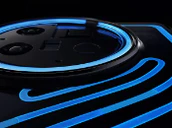Apple iPhone 15 Pro with USB-C port shows up early
Apple usually announces new iPhones in the fall. Therefore, it is somewhat curious that we are already getting a glimpse of the new device during the winter. And yet that is precisely what is happening with these photos.
The photo below shows a thin metal bottom with an unmistakable USB-C port. In itself, nothing crazy was it not for the fact that, according to the source, we are looking at the iPhone 15 Pro. And a USB-C port on an iPhone has not occurred to date. But new regulations and advancing insight are changing that.

By the way, we don't think USB-C is only destined for the iPhone 15 Pro now that we only see the Pro version here. Apple reportedly intends to equip the entire iPhone 15 line-up with the handy universal port. However, previous rumors suggest Apple will give the non-Pro models a slower version. Something that, if true, we don't have a good word for.
Rounder sides
The surfaced photo shows another good thing. Namely, the slightly rounded sides. The iPhone 14 has a rather angular design. We think the slight rounding looks a lot better. Other than that, the layout looks the same as the iPhone 14 Pro, with pentalobe screws to the left and right of the charging port and next to it several speaker holes with mesh in front of it.
Also CAD drawings
In addition to an actual photo, CAD drawings of the device also surfaced. Whether this is a coincidence or not, we dare not say. We see the rounder sides here, but that is not the only difference. For example, the screen bezels will be thinner and the cameras thicker.

The drawings above and below are from China and are typically used by case manufacturers to create matching products. That they are already definitive says how easily Apple gets rid of them each year.

Possibly Apple has a good reason for a thicker camera module. Perhaps Apple is applying larger sensors, although it also cannot yet be ruled out that the iPhone 15 Pro will get a camera with a periscope lens. These are capable of zooming in further without loss of quality. Further than the current 3x. Other manufacturers have been applying these for some time.
It is also expected that Apple will no longer use physical buttons but capacitive ones. These simulate the feeling of touch through a vibration motor. Apple did something similar with the Touch ID button and the Magic Trackpad.



